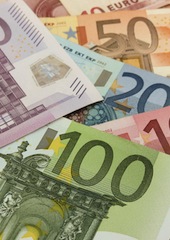Attacking Germany Won’t Create French Jobs
Is it wise for the French to display inertia on economic reforms, while hoping for the election of a new German government? The UK’s former Minister for Europe weighs in.
May 6, 2013

The French Socialist Party has launched a bizarre broadside against Germany. In a draft resolution ahead of a party conference, the party directed an attack on Chancellor Angela Merkel with an accusation that she is personally responsible for Europe’s austerity malaise.
Waiting for Germany to provide the answers to Europe’s collective economic misery, like Waiting for Godot, is simply Freudian transference — finding anyone other than oneself to blame for economic difficulties.
Blaming the German chancellor for the failure of the French economy is not adult politics. And it won’t create French jobs.
New pro-growth reformism is now a priority for the intelligent left as well as the center-right. But telling truth to power when you are in power is not easy politics.
There is a wider, politically-driven European problem. The austerity ideology that dominates Europe is the product of conventional thinkers who run most European governments and control the European Commission, the Council of Ministers, and the European Parliament.
The conservative-liberal and center-right dominant ideology — put into operation by politicians who grew up in the early days of globalization and worshipped at the Alan Greenspan shrine of deregulated debt-driven growth — no longer works.
No one appears to have an alternative apart from blaming the euro or calling for EU withdrawal. The center-left has its own worried electorate who reject reforms that challenge public sector, labor market and welfare state provisions.
In France, President François Hollande and his smarter ministers like Pierre Moscovici and Michel Sapin know this. But they remember the fate of former Chancellor Gerhard Schröder who lost to Merkel in 2005 when his reforms hit voters hard.
It is true that Germany rebounded more strongly than most after the 2008-09 recession. But German growth has slowed markedly. Average real wages in Germany have stagnated since 2000.
German media have highlighted a finding from the European Central Bank that, in terms of household wealth, Cypriots and Spaniards are richer than Germans.
This is a false statistic based on higher levels of home ownership in southern Europe than in Germany, where renting an apartment is the norm.
Wages, pensions, and healthcare access are better in Germany but German TV is dominated by demands that Germans should send no more tax money to Cyprus.
Jean-Claude Juncker, the savvy Luxembourg prime minister once remarked ‘Every leader in Europe knows what to do. They just don’t know how to get re-elected once they’ve done it.’
Schröder did what was needed by loosening the labor market, and launching the conditions for an effective pay freeze for industrial workers. It was great for German capitalism — but spelled disaster for the social democratic-led government.
Merkel doesn’t want to make the same mistake ahead of the German election in September. Telling her core electoral base, the German Mittelstand of small and medium firms, that they should boost demand by increasing wages is the same as telling them to cut profits.
An Obama- or Clinton-style economic renaissance based on importing millions of low-paid immigrants or fracking beneath American soil to produce gas and oil will not work in Germany.
The country is getting older. It is happy to rely on Russian energy to keep the old people’s homes warm in years to come. Gemütlich, cosy Germany simply wants to avoid experiments and be left alone to export Mercedes and Porsches to the rest of the world.
No British prime minister or French president ever thanked the Germans for the personal sacrifices and hard work needed to overcome the division of West and East Germany.
It is hardly likely that the rest of Europe can keep asking German taxpayers to pay for the serial mismanagement and lack of government supervision of banks and financial institutions in other EU member states.
